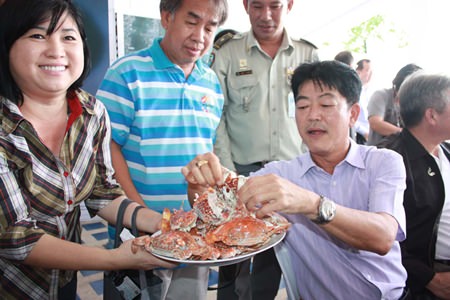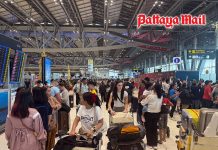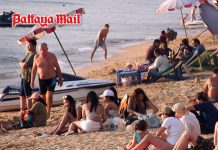Nuanthip Pier, the main gateway to Koh Samet, normally sees up to a dozen trips to the tourist island a day. But since the oil spill that blackened the resort’s western beaches last month, that number has plunged to almost zero.
Pier Manager Arun Runghiran said Aug. 6 only two Taiwanese tour groups passed through the pier and its once-bustling market. Only five passenger boats made the journey, leaving seafood and souvenir vendors rattled and anxious.
“News about the oil spill has caused tourists to stop buying seafood,” lamented Sirirat Jeerasukh, a vendor at Somlak Seafood at the Phe Market. “Only locals are buying now.”
 Pornthep Siriwanarangsan, director-general of the Disease Control Department, indulges in the local crab whilst trying to convince others that Koh Samet seafood is safe to eat.
Pornthep Siriwanarangsan, director-general of the Disease Control Department, indulges in the local crab whilst trying to convince others that Koh Samet seafood is safe to eat.
About 300 souvenir vendors at Nuanthip Pier rallied Aug. 10 to alert the government to the tourist problem. They urged Prime Minister Yingluck Shinawatra to visit the pier market and Koh Samet to hear their complaints and help bring tourists back.
Pornthep Siriwanarangsan, director-general of the Disease Control Department, may have pronounced commercial seafood “safe” to eat, but customers aren’t biting. Phe Market vendors said Koh Samet tourists that once gobbled down crabs, shrimp, clams, and squid stopped buying, and even large mainland hotels have cut back orders.
Pornthep said Aug. 11 that testing showed seafood from the oil-stricken area was free from heavy-metal poisoning. Anyone still worried, however, can thoroughly cook their seafood to eliminate heavy metals entirely, he said.
Sirirat said she even informs customers that much of the seafood comes from large fishing vessels working out of Trat, but still gets few takers.
The same is happening at the Suanson Market in the Muang District of Rayong. Vendors are well stocked with crab, none of which are showing signs of oil contamination. But few are buying. By day’s end, there are good deals to be had, as the sellers dump their stock at clearance prices.
Rayong Gov. Wichit Chatpaisit said the government has already received about 500 claims from affected residents. Those will be presented to PTT Global Chemical Co. in hopes of obtaining compensation.
Natural Resources and the Environment Minister Vichet Kasemthongsri and Marine and Coastal Resources Department Director-General Noppon Srisuk led a delegation of environmental officials to Phrao Beach Aug. 6, promising quick and thorough testing to determine the extent of the damage to marine life.
Noppon said preliminary tests found that some marine life had been reduced by up to 20 percent and that some coral reefs in the oil slick-affected bay have been killed off by bleaching.
Vichet said he formed a ministry committee to evaluate the situation, restore and solve the problem. Environmental scholars including Assistant Professor Phadermsak Janyaphan and Professor Thummasak Yeemin will evaluate the inspections and the effects from the spill, plan measures and guidelines to help restore the environment and specify guidelines to prevent further mishaps.
The Pollution Control Department has proceeded with plans to monitor the environmental effects, including air and water quality in risky areas hit the hardest. The information will be collected and shared with PTT Global Chemical Co., whose people will provide consultations and direct the restoration process.
The Natural Resources and Environment Ministry will test six or more areas, including reefs, general ocean ecosystem, sea grass, mangroves, aquatic animals, and birds.
The Department of National Parks, Wildlife and Plant Conservation, meanwhile, said the cleanup can turn crisis into opportunity by giving them a chance to better regulate service companies, including public utilities, garbage management and wastewater treatment.





